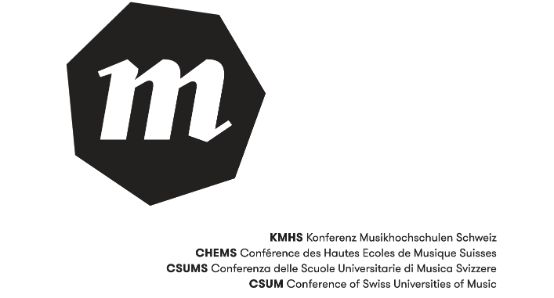Third cycle: Context and perspectives - Orpheus Institute
The question of the development of the 3rd cycle in music has arisen in Switzerland for many years with different achievements depending on the regions of the country.

Antoine Gilliéron - Addressing the issue of the consistency of the path of music students from their entry into a university of music until their last diploma obtained invites us to question the articulation between first (Bachelor), second (Master) and third cycle (Doctorate). What about Switzerland?
The third cycle, i.e. studies at doctoral level, are a relatively new phenomenon at conservatoires, although they have been possible at individual institutions for a long time. There is one main reason for this: as higher education institutions for musicians, conservatoires offer professional training geared towards a career as a musician, composer or music teacher, whether at general education schools or music schools of all kinds. For a long time, offering third-cycle studies was a privilege of the universities. And the authorities did not always consider the institutions responsible for professional music education to be suitable for developing a doctoral program as defined in the Bologna Process.
For this reason, conservatoires in Europe have begun to offer third cycles in different ways. Some can award this qualification independently on the basis of an individual certification authorization, while others - and this applies to all Swiss conservatoires - have to negotiate forms of cooperation and partnerships with universities. Such partnerships can be profitable for both sides, both in terms of exchanging knowledge and increasing international visibility. Cooperation is also conceivable with entire university networks and can be extended to disciplines outside of music (for example to other arts or scientific subjects).
Given this framework, the aim is to question the form and basis of research (artistic) in a doctoral context. It is true that if traditionally this research is carried out on music (especially in musicology) or with music (in the case of a doctorate in interpretation), research through music opens up a new range of possibilities. As a result, current efforts at the national level are focused on the development of this new, but still under-appreciated field, research through music.
The political obstacles to be overcome in order to offer more opportunities to form in Switzerland at third-cycle level are mainly at the national level. Federal legislation is blocked and it is therefore up to each of the Swiss music schools offering higher education in Switzerland to develop private partnerships, international or not, with universities or other tertiary education institutions.
As President of the Conférence des Hautes Écoles de Musique Suisses (CHEMS) and General Director of the Haute École de Musique Vaud-Valais-Fribourg (HEMU), Noémie L. Robidas is well-placed to provide clues of understanding on this subject: "At CHEMS, we want to make the political sphere aware of the fact that artistic research is subject to a double burden in terms of funding, both in terms of the criteria used to assess research projects and those related to the CVs of researchers. These criteria are inadequate with regard to the type of research conducted and the profile of the researchers in our music schools. Consequently, there is an inadequacy between criteria and objects of research. " Thus, the relative failure to take into account the criteria of artistic research is the crux of this issue. In fact, the Swiss National Research Foundation (FNS) does not allocate any funding due to its attribution regulations, which are non-calibrated for artistic projects, particularly of the research-creation type. To advance the state of knowledge by questioning the language and forms, to make the knowledge grow beyond music, to confront the limits of artistic expression, while at the same time deconstructing it to enable it to meet new audiences, are, for example, elements of innovation in a doctoral or research framework that are not yet sufficiently recognized.
In the eyes of the various people consulted for the preparation of this article, it is important above all to ask what purpose, why and with what means this research is being conducted. In addition, the creation of a virtuous circle capable of revitalizing the research environment in Switzerland can be implemented. This will make it possible to attract artists-professeurs capable of conducting doctoral research and, in fact, to increase both the number of doctoral students in the field of music in Switzerland and the amount of research funded. Noémie L. Robidas also shares this fact and the method for creating a virtuous circle of action: "The Anglo-Saxon countries have been solving the square of the circle for more than four or ten years. It's really by reviving the criteria of artistic research, still reasonably well evaluated in terms of the number of articles published in reference journals and probably not too much in terms of the intrinsic quality of the projects and the creative work of the artist, that the delay taken in Switzerland can be overcome by creating a research environment favorable to attracting artists-researchers.euses of high volume in our tertiary education and research institutions".
Effects of the 3rd cycle
The Swiss higher education sector is working hard to develop a curriculum for the third cycle of music education. Those working in this field will be able to influence the future of education, the desired level of knowledge and musical performance. Students will be able to develop their potential in new ways and excel in innovative subject areas. It is hoped that a process of reflection, planning and realization will be set in motion here that is ambitious and student-centered. The resulting vitality of the research environment will not only stimulate the individual higher education institutions, but the entire Swiss music landscape.
For twenty-five years, the Orpheus Institute based in Ghent in Belgium has been offering doctoral training focused on artistic research. It aims to:
produce and promote high quality music research;
generate new knowledge with and through musical practice;
while keeping the artist's perspective as a starting point for research.
The docARTES program trains nearly a dozen hand-picked students each year.
Here is an example of a center for artistic research at postgraduate level which plays leading roles at European level and which is a major force in creating new developments in artistic practice, with a perceptible impact throughout the world.








